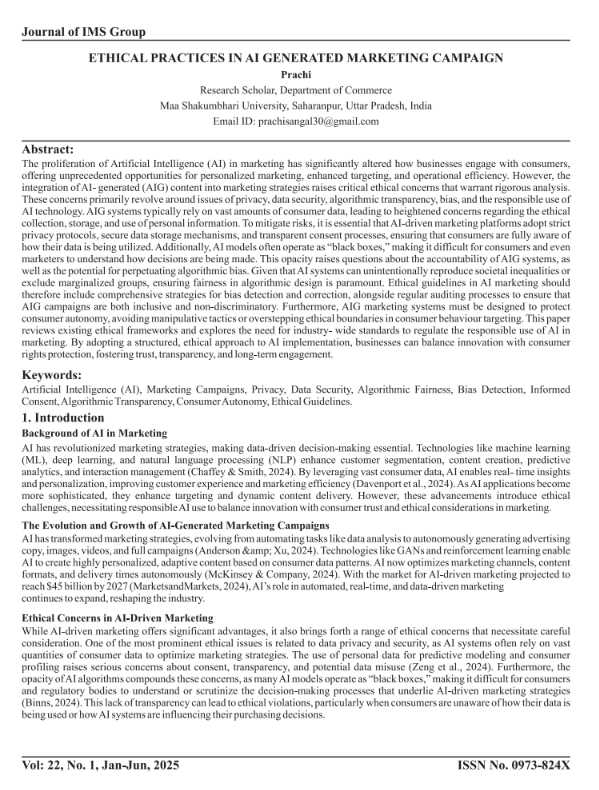ETHICAL PRACTICES IN AI GENERATED MARKETING CAMPAIGN
Keywords:
Artificial Intelligence (AI), Marketing Campaigns, Privacy, Data Security, Algorithmic Fairness, Bias Detection, Informed Consent, Algorithmic Transparency, Consumer Autonomy, Ethical GuidelinesAbstract
The proliferation of Artificial Intelligence (AI) in marketing has significantly altered how businesses engage with consumers, offering unprecedented opportunities for personalized marketing, enhanced targeting, and operational efficiency. However, the integration of AI- generated (AIG) content into marketing strategies raises critical ethical concerns that warrant rigorous analysis. These concerns primarily revolve around issues of privacy, data security, algorithmic transparency, bias, and the responsible use of AI technology. AIG systems typically rely on vast amounts of consumer data, leading to heightened concerns regarding the ethical collection, storage, and use of personal information. To mitigate risks, it is essential that Al-driven marketing platforms adopt strict privacy protocols, secure data storage mechanisms, and transparent consent processes, ensuring that consumers are fully aware of how their data is being utilized. Additionally, AI models often operate as "black boxes," making it difficult for consumers and even marketers to understand how decisions are being made. This opacity raises questions about the accountability of AIG systems, as well as the potential for perpetuating algorithmic bias. Given that AI systems can unintentionally reproduce societal inequalities or exclude marginalized groups, ensuring fairness in algorithmic design is paramount. Ethical guidelines in AI marketing should therefore include comprehensive strategies for bias detection and correction, alongside regular auditing processes to ensure that AIG campaigns are both inclusive and non-discriminatory. Furthermore, AIG marketing systems must be designed to protect consumer autonomy, avoiding manipulative tactics or overstepping ethical boundaries in consumer behaviour targeting. This paper reviews existing ethical frameworks and explores the need for industry- wide standards to regulate the responsible use of AI in marketing. By adopting a structured, ethical approach to AI implementation, businesses can balance innovation with consumer rights protection, fostering trust, transparency, and long-term engagement.



